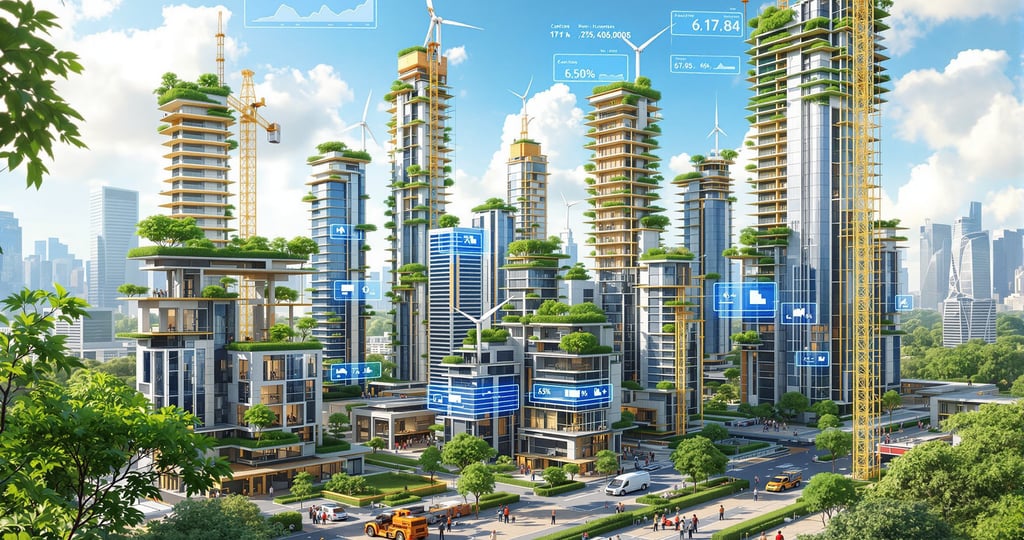Quality and technology IN CONSTRUCTION
delivered with STRAIGHT communication
Day 3 at the UGREEN Event: Practical Steps for Decarbonization
On the third day of the UGREEN event, the practical steps of decarbonization in the construction industry were examined. Experts highlighted sustainable material use, innovative technologies, renewable energy, and energy efficiency. According to UGREEN, industry players must proactively adapt to tightening regulations to remain competitive.
CONSTRUCTIONSUSTAINABILITYARCHITECTURE
Toldy Construct
2/26/20252 min read


Day 3 at the UGREEN Event: Practical Steps for Decarbonization
On the third day of the UGREEN event, experts examined decarbonization strategies in the construction industry, emphasizing that reducing the carbon footprint is not just an environmental concern but also a crucial economic factor. Various practical solutions were presented, ranging from considering the life cycle of construction materials to implementing innovative technologies.
UGREEN’s Approach to Sustainable Construction
Sustainable construction is not merely an alternative but an industry requirement that will shape the long-term competitiveness of the construction sector. Key strategies highlighted during the event included:
Material Selection and Life Cycle Analysis – Considering the full life cycle of construction materials helps reduce environmental impact and energy consumption.
Innovative Construction Technologies – Prefabrication, 3D printing, and modular construction systems minimize waste and increase efficiency.
Integration of Renewable Energy Sources – Incorporating solar, wind, and geothermal systems reduces buildings’ carbon emissions.
Sustainable Waste Management – Reducing construction waste and utilizing recycled materials are essential for sustainable building.
Smart Buildings and Energy-Efficient Systems – Intelligent heating, cooling, and lighting technologies optimize energy consumption.
Practical and Effective Solutions
Case studies presented during the event demonstrated that sustainable construction solutions are not only beneficial for the environment but also lead to significant cost savings. Modular construction systems, for example, can reduce construction waste and completion time by up to 50%. Using locally sourced and recycled materials also helps cut transportation costs and lower carbon emissions.
The growing popularity of passive houses and net-zero buildings further proves that the right design strategies and technologies can achieve significant energy efficiency benefits while enhancing occupants’ comfort.
Decarbonization Trends and Regulatory Directions
The regulatory environment plays a crucial role in achieving sustainability goals. Stricter environmental regulations and incentives for sustainable construction technologies facilitate faster industry adaptation. UGREEN experts emphasized that continuous innovation and compliance with evolving regulations are essential for companies aiming to remain competitive.
The Future of the Construction Industry: Sustainable and Carbon-Neutral
The key takeaway from the third day was that decarbonization is not just an environmental necessity but also an economic advantage. Implementing energy-efficient technologies and sustainable building materials lowers maintenance costs while increasing property value and attractiveness.
UGREEN experts highlighted that integrating sustainable construction cannot be postponed, as industry trends clearly point in this direction. Construction industry players must take proactive steps to adapt to changing market and regulatory conditions while securing long-term competitive advantages through sustainable solutions.
How Can Toldy Construct Help?
Toldy Construct is committed to providing sustainable and cost-effective solutions for construction industry players looking to implement decarbonization strategies. Our services include technical supervision, support for sustainable building technologies, and the development of energy-efficient construction strategies.
🔹 Technical Supervision – Ensuring high-quality execution of energy-efficient and sustainable construction projects.
🔹 Implementation of Innovative Technologies – BIM modeling, modular construction, and prefabrication for faster, more efficient, and eco-friendly building processes.
🔹 Sustainable Material Use & Life Cycle Analysis – Solutions to reduce carbon footprint and minimize waste.
🔹 Regulatory Compliance & Project Management – Helping businesses meet increasingly strict environmental regulations and successfully manage their projects.
Construction
With over 20 years of experience in general contracting, our company specializes in the flawless execution of unique, bespoke buildings. Our innovative methods and mindset make us stand out in the market.
Our services
Contacts
company@toldyconsult.hu
+36 30 289 2383
© 2024. All rights reserved.
Our WEBPAGES
www.toldyconsult.hu
